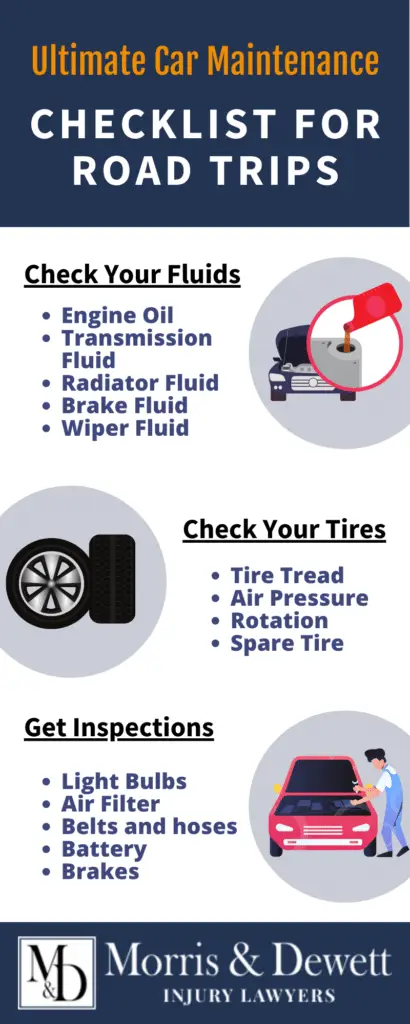Nobody wants to open their wallet to pay the mechanic, but keeping on top of your car’s maintenance can prolong the life of your vehicle and be the difference between getting to your destination safely and experiencing a road malfunction.
If you’re planning for a long road trip, it’s even more important that you prepare your vehicle prior to hitting the road. Our team has prepared a few key car maintenance tips that you can check off to ensure a safe journey for yourself and your family.

Check Your Fluids
Keeping proper fluids within your vehicle plays a huge part in the proper functioning and safety of your car. With engine parts constantly moving, fluids help keep the components properly lubricated and running smoothly. Here are five that you should always check before a trip:
- Engine Oil. Depending on your vehicle and whether you use synthetic or standard oil, you typically should get your oil changed anywhere between 3,000 and 7,000 miles.
- Transmission Fluid. This fluid helps lubricate the various parts of your transmission.
- Radiator Fluid. Also known as coolant, this helps reduce corrosion in your vehicle and provides resistance to freezing.
- Brake Fluid. This allows your vehicle to brake effectively and can help you prevent an accident.
- Windshield Wiper Fluid. You’re likely to use your windshield wipers when driving long distances, so you will want to make sure this is filled.
Check Your Tires
Your vehicle’s tires support the weight of your vehicle, help you brake by transmitting traction, and allow you to steer in the direction you want to go. To ensure your tire functions are adequately met, there are some important things you’ll want to check on a regular basis:
- Tire Tread. Proper tread ensures you maintain traction with the road, so make sure there are no bald spots on your tires.
- Air Pressure. Ensure all your tires have the proper amount of pressure and that they are all equally filled; double-check for any leaks that may require attention.
- Rotation. Tires that aren’t properly rotated or balanced can wear unevenly, so you’ll want to check this prior to a long trip.
- Spare Tire. Whatever you do for your primary tires, also do it for your spare.
Get Regular Maintenance
Regular maintenance can help you improve the functionality of your vehicle and allow you to fix minor problems before they become more troublesome and expensive. Your vehicle owner’s manual will tell you specifically when you should get your car taken in for service. Additionally, here are some things that you can ask your mechanic to check for when you take your car in:
- Light Bulbs. Check your turn signals, brake lights, headlights, high beams, and your vehicle’s interior light bulbs.
- Air Filter. This allows your vehicle’s engine to get clean air and prevents dirt, dust, and other debris from being pulled into your car’s engine.
- Belts and Hoses. These are essential parts of your vehicle and are vital to your engine’s cooling, charging, and air conditioning systems.
- Battery. Your car’s battery provides a power surge that allows it to start; they should be checked annually and may need replacement every four to five years.
- Brakes. A mechanic should also check your brakes annually or every 10,000-12,000 miles driven to ensure they are functioning properly.
Helping You Recover the Right Way
At Morris & Dewett Injury Lawyers, we understand that even the safest drivers who take all the precautions they should can still be injured in accidents caused by negligent or outright reckless drivers. Our Shreveport car accident attorneys are committed to helping those injured across Louisiana and Texas recover the right way. We will guide you through the legal process from start to finish and answer any questions you may have along the way.
Contact our firm at (318) 221-1508 to get started with a no-fee, no-obligation case review. You can also fill out our online contact form and we will get back to you as soon as possible.










